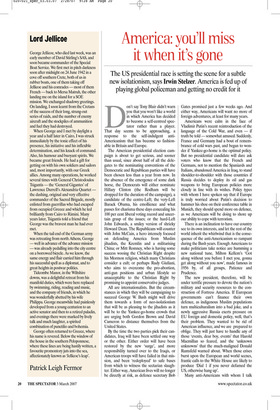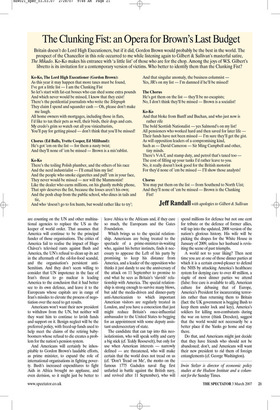America: you’ll miss it when it’s gone
The US presidential race is setting the scene for a subtle new isolationism, says Irwin Stelzer. America is fed up of playing global policeman and getting no credit for it Don’t say Tony Blair didn’t warn you that you won’t like a world in which America has decided to become a self-centred spectator rather than a player. That day seems to be approaching, a response to the self-indulgent antiAmericanism that has become so fashionable in Britain and Europe.
The American presidential election campaign is about to get serious, and sooner than usual, since about half of all the delegates to the nominating conventions of the Democratic and Republican parties will have been chosen less than a year from now. In the absence of the emergence of some dark horse, the Democrats will either nominate Hillary Clinton (the Rodham will be dropped for the duration of the campaign), a candidate of the centre-Left; the very-Left Barack Obama, his emollience and what passes for charisma these days concealing his 100 per cent liberal voting record and uncertain grasp of the issues; or the hard-Left John Edwards, a smiley version of shrieky Howard Dean. The Republicans will counter with John McCain, a hero intensely focused on defending America from Muslim jihadists, the Kremlin and a militarising China; or Mitt Romney, who is having some success wooing the Christian Right despite his Mormon religion, which many Christians consider a cult; or perhaps Rudy Giuliani, who aims to overcome the pro-abortion, anti-gun positions and urban lifestyle so unacceptable to the Christian Right by promising to appoint conservative judges.
All are internationalists. But the circumstances in which they will be campaigning to succeed George W. Bush might well drive them towards a form of neo-isolationism that will be as pleasing to the jihadists as it will be to the Yankee-go-home crowds that are urging both Gordon Brown and David Cameron to distance themselves from the United States.
By the time the two parties pick their candidates, Iraq will have been settled one way or the other. Either order will have been restored by the new ‘surge’, and more responsibility turned over to the Iraqis, or American troops will have failed in that mission, and been ‘redeployed’ to safe bases from which to witness the sectarian slaughter. Either way, American lives will no longer be directly at risk, as defence secretary Bob Gates promised just a few weeks ago. And either way, Americans will want no more of foreign adventures, at least for many years.
Americans were calm in the face of Vladimir Putin’s recent reintroduction of the language of the Cold War, and even — if truth be told — somewhat amused. Suddenly, France and Germany had a bout of remembrance of cold wars past, and began to wonder if Yankee-go-home is the optimal policy. But no presidential candidate will dare ask voters who know that the French and Germans, not to mention the Spaniards and Italians, abandoned America in Iraq, to stand shoulder-to-shoulder with those countries if Russia decides to deploy its oil and gas weapons to bring European policies more closely in line with its wishes. Policy types with whom I have spoken say that if Europe is truly worried about Putin’s decision to hammer his shoe on their conference table in Munich, they should spend more on defence, as we Americans will be doing to shore up our ability to cope with terrorism.
There is an inclination to have our country see to its own interests, and let the rest of the world inherit the whirlwind that is the consequence of the anti-Americanism so rampant during the Bush years. Enough Americans to make politicians take notice are humming a new national tune, Milton Kellem’s ‘Got along without you before I met you, gonna get along without you now’, made famous in 1956 by, of all groups, Patience and Prudence.
The new president, therefore, will be under terrific pressure to devote the nation’s military and security resources to the construction of Fortress America. If European governments can’t finance their own defence, as indigenous Muslim populations turn multiculturalism into a bad joke, and a newly aggressive Russia exerts pressure on EU foreign and domestic policy, well, that’s their problem. They wanted to be rid of American influence, and we are prepared to oblige. They will just have to handle any of those ‘events, dear boy, events’ that Harold Macmillan so feared, and the ‘unknown unknowns’ that the much-maligned Donald Rumsfeld warned about. When those crises burst upon the European and world scenes, frantic calls to the White House are likely to produce ‘Dial 1 if you never defamed the US, otherwise hang up’.
Many anti-Americans with whom I talk are counting on the UN and other multinational agencies to replace the US as the keeper of world order. That assumes that America will continue to be the principal funder of those organisations. The critics of America fail to realise the impact of Hugo Chávez’s televised rants against Bush and America, the UN’s refusal to clean up its act in the aftermath of the oil-for-food scandal, and the organisation’s persistent antiSemitism. And they don’t seem willing to consider that UN impotence in the face of Iran’s threat to go nuclear is leading America to the conclusion that it had better see to its own defence, and leave it to the Europeans whose capitals are in range of Iran’s missiles to elevate the process of negotiation over the need to get results.
Americans won’t want their new president to withdraw from the UN, but neither will they want him to continue to lavish funds and support on it. Benign neglect will be the preferred policy, with freed-up funds used to help meet the claims of the retiring babyboomers whose refusal to die creates a problem for the nation’s pension system.
And Americans will certainly be inhospitable to Gordon Brown’s laudable efforts, as prime minister, to expand the role of international organisations in fighting poverty. Bush’s increased expenditures to fight Aids in Africa brought no applause, and even derision, so it might just be better to leave Africa to the Africans and, if they care so much, the Europeans and the Gates Foundation.
Which brings us to the special relationship. Americans are being treated to the spectacle of a prime-minister-in-waiting who, against his better instincts, finds it necessary to appease the Left of his party by promising to keep his distance from America, and a leader of the opposition who thinks it just dandy to use the anniversary of the attack on 11 September to promise to end what he sees as Britain’s ‘slavish’ relationship with America. The special relationship is strong enough to survive many blows, but add the media-driven and dinner-party anti-Americanism to which important American visitors are regularly treated in London, and you have a concoction that just might reduce Britain’s once-influential ambassador to the United States to begging for an appointment with some deputy assistant undersecretary of state.
The candidate that can tap into this neoisolationism, who will speak softly and carry a big stick (cf. Teddy Roosevelt), but only for use when American interests — narrowly defined — are threatened, who will make certain that the world does not tread on us (cf. ‘Don’t Tread on Me’, the motto on the famous 1775 Gadsden naval flag first unfurled in battle against the British navy, and revived after 11 September), who will spend millions for defence but not one cent for tribute or the defence of former allies, will tap into the updated, 2008 version of the nation’s glorious history. His wife will be picking the drapes for the White House in January of 2009, unless her husband is revisiting the scene of past triumphs.
A world not to your liking? Then next time you are at one of those dinner parties at which it is a certain crowd-pleaser to defend the NHS by attacking America’s healthcare system for denying care to over 40 million, a staple of most dinner parties we attend (false: free care is available to all), American culture for debasing that of Europe, America’s President for incarcerating terrorists rather than returning them to Britain (fact: the UK government is begging Bush to keep them under lock and key), America’s soldiers for killing non-combatants during the war on terror (think Dresden), suggest that the world would not necessarily be a better place if the Yanks go home and stay there.
Do that, and Americans might just decide that they have friends who should not be abandoned; don’t, and Americans will want their new president to rid them of foreign entanglements (cf. George Washington).
Irwin Stelzer is director of economic policy studies at the Hudson Institute and a columnist for the Sunday Times.











































































 Previous page
Previous page